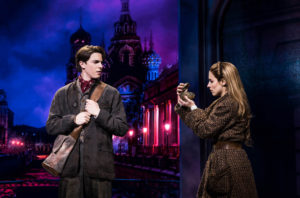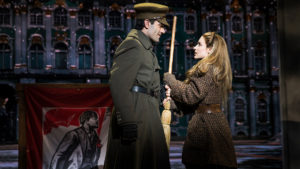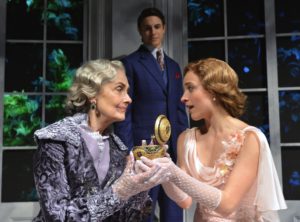A phrase I’ve grown tired of is “Your mileage may vary.” Don’t roll your eyes: I know I’ve used it myself, and I know why I’ve done so. The phrase gives me an “out” so that if I do not like something I review, I can add in a “but you might” clause and keep the angry mobs off my trail. Conversely, if I like something that is being derided by the public groupthink, I can protect what I presume is my credibility. “Your mileage may vary” is, therefore, a cop-out, and not a particularly clever one.
 Still, I have to apply the phrase to my experience with attending a matinee performance of the Broadway musical Anastasia. It is not for any greater protective cover. I thoroughly enjoyed this performance, and there have been only a few critics (to my knowledge) who would disabuse me of my opinion. I say that your experience may be different because all the events surrounding this performance colluded to make the show that much more enjoyable for me. (More on these points later on.)
Still, I have to apply the phrase to my experience with attending a matinee performance of the Broadway musical Anastasia. It is not for any greater protective cover. I thoroughly enjoyed this performance, and there have been only a few critics (to my knowledge) who would disabuse me of my opinion. I say that your experience may be different because all the events surrounding this performance colluded to make the show that much more enjoyable for me. (More on these points later on.)
For starters, the musical is based (very loosely) on the 1997 animated film by Gary Goldman and Don Bluth. Bluth is notable as the co-director of movies like An American Tail, The Land Before Time, and The Secret of N.I.M.H., as well as a co-creator of the innovative animated arcade game Dragon’s Lair. Prior to all these, Bluth was a Disney animator who worked on Robin Hood and Pete’s Dragon.
Significantly, some of the flashier elements of the movie, like Rasputin and Bartok the Bat are not involved at all in the play, which picks up more of the historical elements of the legend of Grand Duchess Anastasia Nikolaevna of Russia.
In 1916, Tsar Nicholas II and the entire Romanov family aside from his mother, the Dowager Empress who lives in Paris, are executed or so it is presumed. The legend insists that the young Grand Duchess, eight-year-old Anastasia, survived the slaughter. For many years, the Dowager Empress has held out hopes that the rumors are true and has offered up a considerable amount of money for anyone who might deliver her to France and to safety. This offer naturally provoked many to proffer candidates, both to give an heir back to the Empress and to get a lot of cash out of the deal.
 This is where the story’s main theme resides for the play. Schemers Dmitry (Derek Klena) and Vlad (John Bolton) want out of the totalitarianism infecting Russia. They see the delivery of the long-lost Anastasia as their best, and maybe their only way to do this. They interview woman after woman to see if they can find someone who can carry off the charade, but none have the regal demeanor of former royalty.
This is where the story’s main theme resides for the play. Schemers Dmitry (Derek Klena) and Vlad (John Bolton) want out of the totalitarianism infecting Russia. They see the delivery of the long-lost Anastasia as their best, and maybe their only way to do this. They interview woman after woman to see if they can find someone who can carry off the charade, but none have the regal demeanor of former royalty.
That is until they cross Anya the street sweeper, played by Christy Altomare. She sticks to the shadows and keeps her head down. An amnesiac, she’s living a life of her own construction, attempting not to get in trouble. Trouble, in those days, meant probable incarceration and possible execution. Anya is not interested in either and, likewise, is not receptive to Dmitry and Vlad’s scheme. But every time she is asked to recite the history of Anastasia, she goes into a trance and seems transformed – hardly a lifelong street cleaner.
This secret collusion has not gone unnoticed. Government loyalist Gleb, played by Ramin Karimloo, suspects something is going on and he has a personal reason to see that it stops. His father was a part of the execution squad that assassinated the Tsar and his family. If in fact, one of them escaped, it would pose a threat to the loyalists of the Uprising, as well as a significant badge of dishonor to Gleb’s family. If Anastasia is still alive, or even if an imposter makes others think she is alive, it will fall upon him to fulfill his duty, “to be his father’s son,” and finish the job.
The first act of the show is all set-up, with Anya starting to believe that maybe she actually is the person Dmitry and Vlad are pretending she is. Sequences with Altomare, Klena, and Bolton as they polish their deception work very well and frequently share DNA with another teacher/student relationship, being Professor Higgins and Eliza Doolittle in My Fair Lady. But it all comes to a halt when Gleb asserts his threats. The trio has to get out of Russia and to Paris immediately or they might not live much longer.
 The second act sets up scenes which the entire production has been leading to: Vlad’s reunion with Countess Lily, played by Caroline O’Connor, in some of the best and most comical moments of the show; the Dowager Empress’ first sight of what might or might not be Anastasia at a performance of Swan Lake; and the moment when Anya is finally given an opportunity to prove if she is who she now thinks she is, with only a musical box given to her by the Empress prior to the slaughter of the Romanovs available as material proof. This is the scene that will, most likely, be the most affecting to audiences. Mary Beth Peil as the Empress is truly heartbreaking as she balances the desires of a grandmother who wants to have her family back with her with the weight of an exile, shouldering more than a decade of fakers trying to deceive themselves into her graces.
The second act sets up scenes which the entire production has been leading to: Vlad’s reunion with Countess Lily, played by Caroline O’Connor, in some of the best and most comical moments of the show; the Dowager Empress’ first sight of what might or might not be Anastasia at a performance of Swan Lake; and the moment when Anya is finally given an opportunity to prove if she is who she now thinks she is, with only a musical box given to her by the Empress prior to the slaughter of the Romanovs available as material proof. This is the scene that will, most likely, be the most affecting to audiences. Mary Beth Peil as the Empress is truly heartbreaking as she balances the desires of a grandmother who wants to have her family back with her with the weight of an exile, shouldering more than a decade of fakers trying to deceive themselves into her graces.
Devotees of the animated movie and the 1956 film which preceded it may have issues with the changes that have been made. You can speculate whether the presence of Rasputin or his bat would have been possible to undertake onstage without looking foolish. I suppose anything is possible after The Lion King. Regardless, Karimloo’s Gleb ends up being a more compelling antagonist, conflicted by his own moral compass which is telling him the times are changing, and the pressures of history and familial honor that assert the times are changing only because weak people will not defend the old, revolutionary ways.
Terrence McNally, whose prior credits include Kiss of the Spider Woman and Ragtime, fashions a storyline that manages to be traditional without feeling like a throwback. His frequent collaborators Lynn Ahrens and Stephen Flaherty (also Ragtime) are responsible for the lyrics and music, and in this instance, they were a natural choice.The duo was responsible for the original songs from the animated film and, therefore, were best-suited to expand upon the repertoire. The cast is excellent and astounding in the knowledge that they would have to build back up to the same energy level only hours later for the day’s second performance.
 The Broadhurst Theater is small…really small. I am assured by my guest for the performance that this is one of the smallest theaters she’s been to on Broadway, but the production design more than compensates for the forced intimacy. With revolving panels onstage and extensive rear-screen digital projections, the limited real estate extends back into massive filing libraries, countrysides, grand halls, and the Seine River as spanned by Pont Alexandre III. For anyone unaccustomed to actual Broadway performances, Anastasia identifies itself as a great entry point, as it is as much an audio-visual experience as it is a live performance. During one of Anya’s haunting dream sequences, projections of her dancing murdered ancestors not only move about the stage but out into the audience.
The Broadhurst Theater is small…really small. I am assured by my guest for the performance that this is one of the smallest theaters she’s been to on Broadway, but the production design more than compensates for the forced intimacy. With revolving panels onstage and extensive rear-screen digital projections, the limited real estate extends back into massive filing libraries, countrysides, grand halls, and the Seine River as spanned by Pont Alexandre III. For anyone unaccustomed to actual Broadway performances, Anastasia identifies itself as a great entry point, as it is as much an audio-visual experience as it is a live performance. During one of Anya’s haunting dream sequences, projections of her dancing murdered ancestors not only move about the stage but out into the audience.
Now, if you have read carefully up to this point, you might have a sense of why I said what I said at the top of this review. This was, in fact, my first experience with an honest-to-god Broadway production. There was little question that I would be impressed by what I saw. I was there with a guest, and at that moment this was the only person I would have wanted to be there with. The show was attended after several extremely difficult weeks of family crises, so I was in a perfect mood for escapist entertainment. Even lunch was great. None of these externalities ought to diminish one’s expectations for the show.
Critics are not supposed to let the exterior circumstances of their lives influence their opinions, but I disagree. The average theater-goer is not going to a show to dissect it for the purposes of relating it back to the readership or to determine its cultural or artistic worthiness. They go to be entertained, transported, or at least removed from their day-to-day dramas. On those merits, Anastasia more than delivered and a full matinee audience seemed to agree.
Find someone (or several someones) you care about and venture out to the Broadhurst Theater for an afternoon or evening to see Anastasia. It’s an energetic and eye-grabbing production that would entertain even without all the extras that came with my experience, but for the benefit of honesty and full disclosure, my memories of the day will always position the performance as one part of it, rather than being central to it. In other words, “your mileage may vary.”





Comments